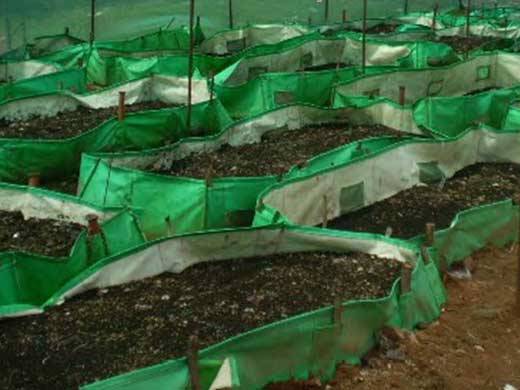Worm farming and the benefits of vermicompost are well documented and have attracted a lot of interest in recent years, particularly with the increase of 'green' consciousness and growing concern over the sustainability of fossil-fuel based agriculture.
The demand for Organic foodhas increased dramatically as consumers choose Organic over conventionally farmed produce, and often these consumers are prepared to pay a premium for quality Organic products. This consumer pressure, together with the fact that fossil-fuel synthesized fertilizers are unsustainable, harmful to the environment and becoming increasingly expensive, has driven the growing demand for high quality organic fertilizers and pest control.
While domestic worm farming (vermicomposting) is increasingly popular, there are numerous disadvantages associated with scaling up existing vermicomposting techniques, and achieving efficient processing at increased scales. These limitations have hampered the widespread
adoption of commercial vermicomposting operations, and the existing large-scale vermicomposting methods are generally quite crude and inefficient (windrows, beds), or require considerable effort to operate (trays, stacking trays). Promising new vermicomposting technologies include more efficient, notably 'high tech' continuous flow 'reactors' with a mesh floor and 'breaker bar' harvesting mechanism. While this system has its advantages, the engineering and method of working are expensive and technologically complex.
Worm composting (vermicomposting) breaks down organic wastes, rapidly transforming them into a stable, non-toxic material with good structure, porosity, aeration, drainage and moisture-holding capacity. Organic wastes are ingested by earthworms and egested as a finely divided peat-like material referred to as vermicompost. Vermicompost supplies minerals and improves nutrient availability to plants. Vermicompost is considered as a high quality horticultural compost due to its homogeneous texture, desirable characteristics, reduced levels of contaminants and tendency to hold more nutrients over a longer period, without adversely impacting the environment.
During the vermicomposting process, important plant nutrients that are present in feed material (such as nitrogen, potassium, phosphorous and calcium) are converted into forms that are much more soluble and available to plants than the parent compounds. Vermicompost has also been reported to contain biologically active substances such as plant growth regulators which stimulate seed germination, rooting and flowering. Vermicompost contains beneficial microorganisms and compounds that suppress pathogenic nematodes, bacteria, fungi and arthropod insect pests
Like composting, during the vermicomposting process pathogens and disease causing organisms are eliminated in an aerobic process, which involves the bio-oxidation and stabilization of organic material. However, unlike composting it involves the joint action of earthworms and micro-organisms and the process does not involve a thermophilic (hot) stage. Vermicomposting leads to an increased nitrogen mineralization rate and the humification processes that take place are greater and faster than during regular composting. A decrease in the carbon from fulvic acids and an increase in the percentage of carbon from humic acids are observed in vermicomposting as compared to composting.
Features:
- Timely execution
- Competitive prices
- International standards
- Modern technology

